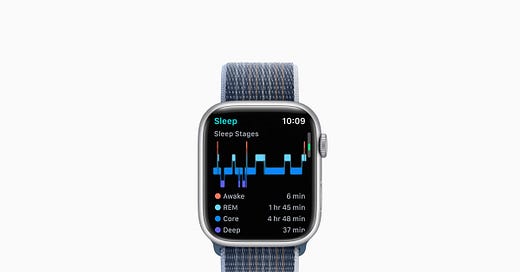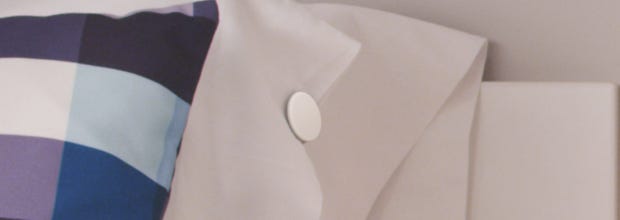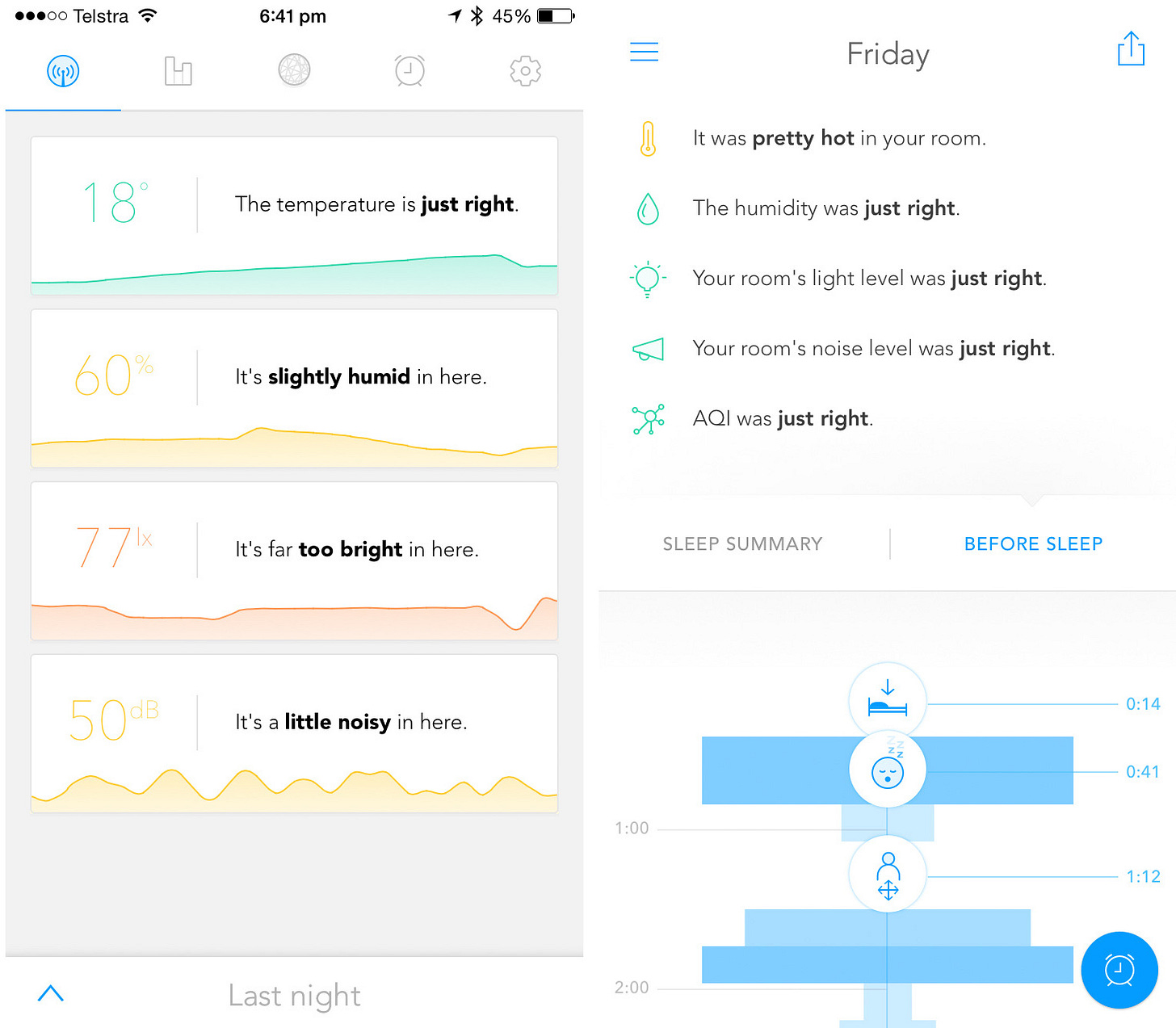Hi. I’m Stepa Mitaki. I’m a product person and an entrepreneur. I’ve been working in 🏙 govtech for eight years and currently work at a UK-based 🏦 fintech startup Silverbird while building a new company in 👩🏼⚕️ healthtech on the side.
Morning Walk is a personal weekly newsletter where I share some musings on tech, digital healthcare, working on startups, productivity, some nerdy stuff and an occasional share of reflections on the Ukraine war and how it feels being Russian at this moment in history.
This issue was sent out to 230 subscribers (-1 from the previous week). Last week’s issue received 472 views.
💤 My history with sleep tracking
This past week was one of the most exciting weeks of a year for any Apple nerd out there – new iOS 16 and watchOS 9 were released. As usual, I'm more excited about the new iPadOS (coming in October), but several additions to iOS and watchOS got me interested in trying them out. One of them is improved sleep tracking on the Apple Watch, which now shows stages of your sleep (Awake, REM, Core, and Deep).
My history with sleep tracking goes a long way. Back in 2015, I backed on Kickstarted this fantastic product called Sense. Even at that time, the premise was quite innovative. While most other sleep tracking devices were clunky, big, and, quite frankly, uncomfortable to wear, there wasn't anything to wear with Sense. The product consisted of two parts. The first one is this relatively small HomePod-like station that you put on the bed table.
It contained some sensors that let you measure five key aspects this affect quality of your sleep:
It contains some sensors that measure five key aspects that affect the quality of your sleep:
Noise (in your bedroom and beyond)
Lighting
Temperature
Humidity
Air quality (it could identify particulates such as dust and pollen)
In addition to that, you had a little device called Sleep Pill. It’s a clip you attach to your pillow to track your sleep at night. You didn’t have to put on any uncomfortable wearables or remember to charge something or press a button. It just was there on my pillow all the time, and it knew when I was simply lying in bed, falling asleep, soundly asleep, thrashing about, or waking up. Everything.
On top of that, you get a gorgeous mobile app that shows the quality of your sleep each night and could even suggest what might have affected it (e.g., if the temperature was too hot). You could have even seen on a beautiful timeline that you woke up in the middle of the night because of some noise.
But my favourite part was it’s Smart Alarm. It woke me up at the right point of my sleep cycle, to avoid that groggy feeling we all hate so much. It was the best waking up I had in ages!
Here is their marketing video:
Unfortunately, they had to shut down two years later and turn off their servers. Both devices turned into useless bricks overnight. They had a great fan base but couldn’t compete with big players and lacked a subscription model to make the economy work.
Since then, I have made a few attempts to track my sleep again but couldn’t get used to wearing anything. I’ve tried Fitbit and Oura ring, but nothing stuck. I tried sleeping with my Apple Watch two years ago when Apple introduced sleep tracking. But it was the worst sleep I had had in months.
With watchOS 9, I decided to give it a try again. To my surprise, it’s been much better so far. Maybe part of that was wearing a braided solo loop band instead of their default sport band, which doesn’t have any bracing. I still notice Apple Watch with me, but it’s not that uncomfortable this time, so I decided to collect 3-4 weeks of data and proceed from there.
Then, I found this video that not just explains how exactly Apple tracks sleep, which is phenomenal, by the way (hint: obtain a bunch of data on sleep studies and throw in complex machine learning) but runs a real test of the Apple Watch against polysomnography (the gold standard for sleep studies among scientists). Turns out, it’s the most accurate consumer device on the marker for sleep tracking. That got me even more interested in trying out this feature.
Anyway, there is nothing to report just now. I’m curious to collect more data to see where this experiment would lead me and my sleep habits. I’ll most probably share my findings in a couple of months.
The most crucial part, obviously, is not the data itself but what you do with that data. I still haven’t seen any good solution to that problem (not just with sleep but with any kind of self-tracking). Apple doesn’t approach that in any way, and I would probably have to deal with that on my own for the time being.
Recommendations of the week
🛰 Varda: Manufacturing in Microgravity (company)
Let’s be honest, it’s not that often that I see a new company or a product, and I drop my jaw. But when this happens, it’s one of the most amazing feelings I know.
It turns out that some products are impossible to make on Earth due to gravity, and we can take advantage of producing them in space (decades of research prove that). Varda builds a platform (with spacecraft and stuff) to manufacture these kinds of products and bring them back to Earth. Applications for this include pharmaceuticals, hypersonic testing, and fiber optics.
Seeing a company like this isn’t just refreshing after countless overhyped companies you see in media every day but also inspiring on so many levels. Anything is possible, and we might forget this from time to time. Varda is an excellent example that there are no boundaries to human ambition.
…
🌠 Richard Feynman’s Letter on What Problems to Solve (read)
When you see someone who started a company to manufacture products in microgravity, you might start doubting yourself. Thinking that the problems you are working on might not be worthwhile or ambitious enough.
Here is a little piece of inspiration from the great Richard Feynman to balance you out.
The worthwhile problems are the ones you can really solve or help solve, the ones you can really contribute something to. A problem is grand in science if it lies before us unsolved and we see some way for us to make some headway into it. I would advise you to take even simpler, or as you say, humbler, problems until you find some you can really solve easily, no matter how trivial. You will get the pleasure of success, and of helping your fellow man, even if it is only to answer a question in the mind of a colleague less able than you. You must not take away from yourself these pleasures because you have some erroneous idea of what is worthwhile.
🗯 Promo
Every day Refind picks 7 links from around the web for you, tailored to your interests. Loved by 50k+ curious minds. Subscribe for free today.
That’s it for today. Thanks for reading. Until next week 👋🏻
This post is public so feel free to share it.









